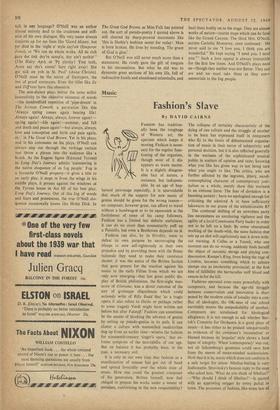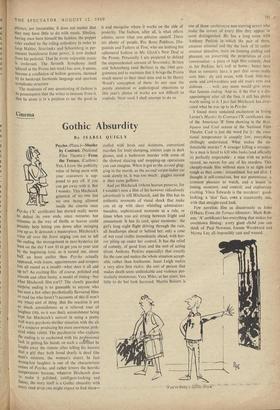Music
Fashion's Slave
By DAVID CAIRNS
Fashion can also, by its frivolity, seem to defeat its own purpose by encouraging the blimps to stew self-righteously in their own prejudice and by providing them with the flimsy rationale they need to make their resistance decent; it was the antics of the Britten faction that gave pretext for the reaction against his music in the early Fifties from which we are only now emerging—that last great public dis- play of British philistinism, the first-night mas- sacre of Gloriana, was a direct outcome of the sort of grotesque cliquishness which could seriously write of Billy Budd that 'as a tragic opera it also refers to Otello or perhaps rather to some tragedy Verdi might have written not before but after Falstaff.' Fashion can sometimes be the means of blocking the advance of genius by setting up pseudo-genius in its path. It can clutter a culture with mummified mediocrities dug up from an earlier time—witness the fashion for nineteenth-century 'singer's opera,' that ex- treme symptom of the necrophilia of our age. But on balance it has probably been, in the past, a necessary evil.
It is only in our own time that fashion as a manifestation of unease has got out of hand and spread feverishly over the whole state of music. How else could the greatest composer of his generation, Britten himself, now feel obliged to present his works under a veneer of serialism, conforming to the new respectability?
The collapse of certainty characteristic of the dying of one culture and the struggle of another to be born has expressed itself in composers who fly to the limits of dehumanised organisa- tion of music in their terror of subjectivity and personal decision, but it is also reflected generally in the wariness of the sophisticated musical public in matters of opinion and taste; knowing what you like has given way to not being sure what you ought to like. The critics, who are further affected by the ingrown, jittery, navel- contemplating character of contemporary jour- nalism as a whole, merely show this wariness in an extreme form. The fear of deviation is a haunting anxiety : have we apologised enough for criticising the admired A or been sufficiently lukewarm in our praise of the unfashionable B?
The continual shifting of an unwritten party line necessitates an unrclaxing vigilance and the agility of a local Communist Party leader in order not to be left on a limb. By some obsessional working of the death-wish, the same fashion that sets up an idol will capriciously tear it down with- out warning. A Callas or a Tureck, who one moment can do no wrong, suddenly finds herself the object of sarcastic shrugs and pitying con- descension. Kempe's Ring, from being the rage of London, becomes something which to admire stamps one as intolerably provincial; at the first hint of fallibility the barracudas sniff blood and swarm in for the kill.
Fashions operated even more powerfully with composers, and because the age-old struggle between conservatism and innovation is shar- pened by the modern crisis of tonality into a con- flict of ideologies, the OK-ness of one school inevitably means the unspeakability of another. Composers are scrutinised for ideological allegiance; it is not enough to ask whether Bar- tok's Concerto for Orchestra is a good piece of music —it has either to be praised unequivocally as evidence of the composer's 'recantation' or blamed because its 'popular' style shows a fatal lapse of integrity. When 'contemporary' was out, not all Schoenberg's greatness could save him from the sneers of mean-minded academicism. Now that it is in, music which does not conform is a safe target for abuse. Sibelius-baiting is very fashionable. Stravinsky's famous reply to the man who asked him, 'What do you think of Sibelius?' --'Why should I think of Sibelius?'—is quoted with an approving snigger by every jackal in town. The processes of fashion, like somelaw of physics, are inexorable; it does not matter that they may have little to do with music. Sibelius, having once been himself the fashion, the puppet ruler exalted by the ruling orthodoxy in order to keep Mahler, Stravinsk% and Schoenberg in per- manent banishment from power, is now dashed from his pedestal. That he wrote enjoyable music Is irrelevant. The Seventh Symphony itself (Played at the Proms last week) has now, it seems, become a conflation of hollow gestures, damned by its bankrupt harmonic language and spurious sYmphonic structure.
The weakness of any questioning of fashion is Its presumption that the writer is immune from it, that he alone is in a position to see the good in it and recognise where it works on the side of posterity. The fashion, after all, is what others admire, never what one admires oneself. There are plenty of people, Pro Bono Publicos, Dis- gusteds and Fathers of Five, who see nothing but ephemeral fashion in Mr. Glock's New Deal at the Proms. Personally I am prepared to defend the unprecedented amount of Stravinsky, Britten and Schoenberg (and Berlioz) in the 1960 pro- grammes and to maintain that it brings the Proms much nearer to their ideal state and to Sir Henry Wood's conception of them. In any ease the purely statistical or anthological objections to this year's choice of works are not difficult to explode. Next week I shall attempt to do so.



































 Previous page
Previous page